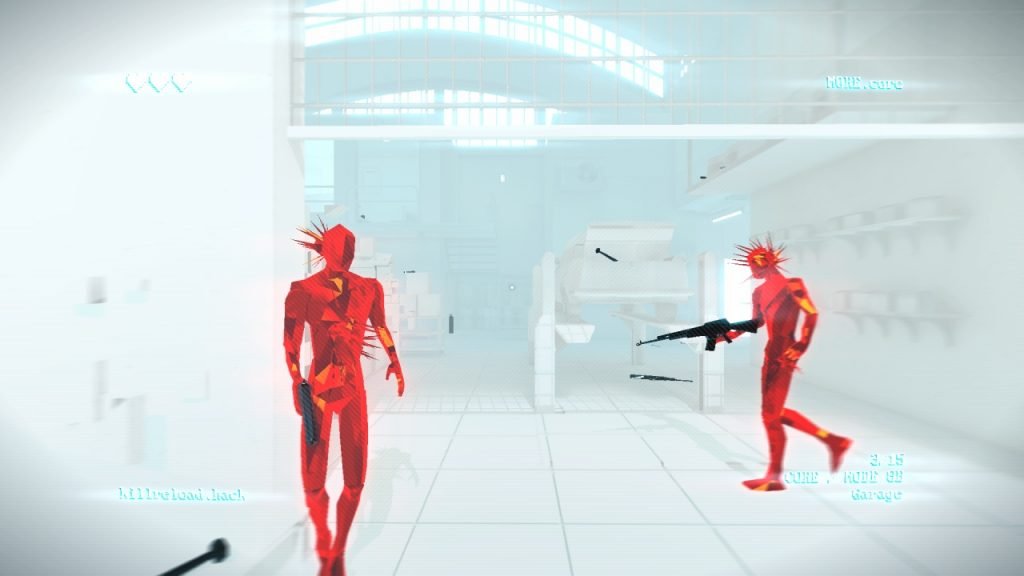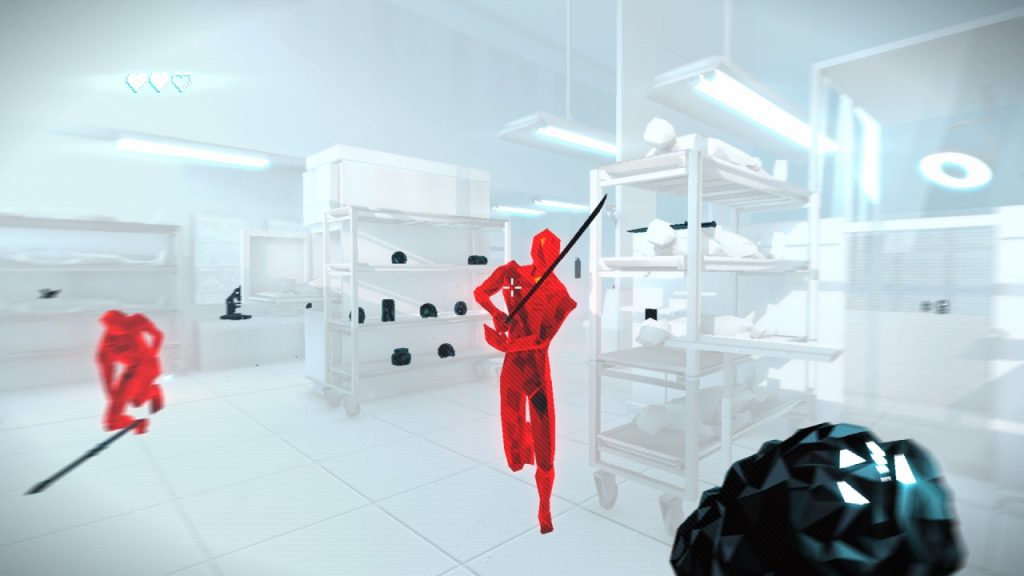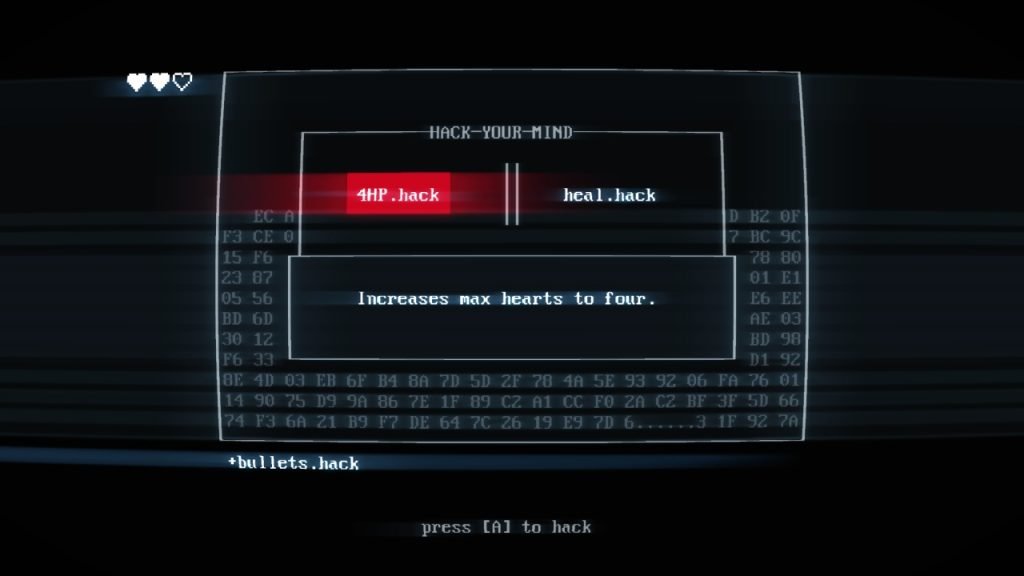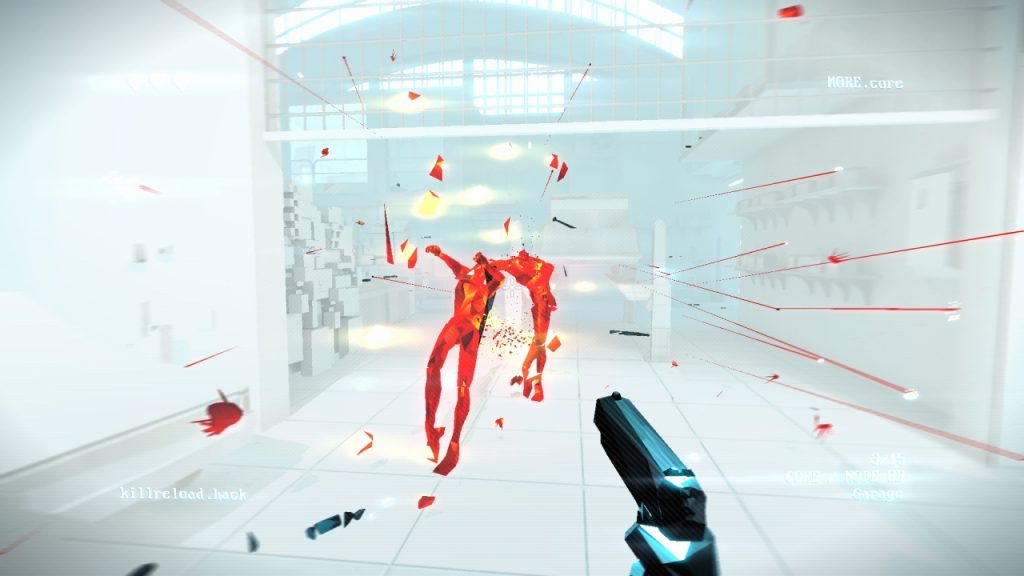Superhot: Mind Control Delete is the third game in the Superhot first-person shooter series, a franchise where time only moves when you do. Following the original Superhot and Superhot VR, Superhot: Mind Control Delete takes the established formula and crosses it with roguelike elements. That means lots of replayability, a variety of gameplay modifications, and a different storytelling approach. This new take on the entertaining slow-mo shooter gameplay of Superhot might make sense on paper, but does it feel fun in practice? Does Superhot: Mind Control Delete successfully translate the signature meta-storytelling within the new genre? Let’s see if the third time’s the charm for Superhot, or if this stylistic roguelike is a spin-off that showed be slowed down.

Stop, Bullet Time
If you’ve played either the previous Superhot games, Superhot: Mind Control Delete should feel pretty familiar at first. Playing as an unnamed, unvoiced gunman, you move through stark white environments as you shoot through waves of red bad guys. Time moves as you move, so every shot, turn, and throw must be calculated to avoid death. Guns have limited ammo, so you’ll have to grab enemy weapons out of the air as they drop them, or utilize any of the throwable objects and melee weapons scattered around the stage. If you don’t stop and think about your actions, you’ll likely be overwhelmed and forced to restart the set of levels you’re attempting to complete.

Superhot: Mind Control Delete continues to offer gunplay that makes you feel like a cold and calculated killer, slowly piecing together the most efficient and stylish way to execute your opposition. That said, there are still some major changes to the gunplay that have been introduced. Levels are bigger and contain far more active objects than before, encouraging you to take cover and lure your enemies in. Where the original Superhot felt more like a puzzle game, Superhot: Mind Control Delete is faster paced and falls better in line with what you’d expect from a first-person shooter.
A Variety of Reds
Mind Control Delete also introduces new enemy-types to deal with, adding a bit more variety than the standard red baddies. Some enemies are also armored, with only certain areas of their body vulnerable to attack. Other foes have spikes sticking out of their bodies which detonate upon death, sending them flying across the stage. There are also a handful of specialized enemies that attempt to disrupt you in unique ways, but they only appear every so often.

The AI has also seen some improvement, making foes harder to slay than before. Red baddies will dodge and weave more often, move in unpredictable patterns, all while attempting to flank you. Enemies with melee weapons love to swat away the objects you throw at them, which can disrupt your combat flow.

Generally speaking, you won’t be able to scrape by using the same tactics from previous Superhot games. The lengthier levels and more chaotic gameplay offer a nice boost of action for those who felt it lacking before, but it does end up making the levels feel a bit less strategic.
Superhot Super-Nodes
Although the gunplay is mostly the same, the structure in which the levels are laid out is very different from other Superhot games. After a short set of introductory levels, you’ll get a choice in what set of levels you attempt next. Levels are contained within nodes, which when completed, uncover other nodes to clear. There are usually anywhere from three to ten levels in a given node, with a nice difficulty curve as you progress. Some end-game nodes contain up to fifteen or twenty levels, which might sound pretty challenging. However, unlike other Superhot games, you are given a default of three hearts of health to negate damage. Health can be regenerated depending on the upgrades you gather between levels, but it’s always best to assume that the next bullet you take will be your last.

At any given time, you’ll usually have two or three available nodes to attempt, so you don’t have to worry about getting stuck on a particularly tough level without any other way to advance. Unfortunately, you might have trouble telling some of the nodes apart, as many of the levels are reused between them. Unlike some other roguelikes, level layouts in Superhot: Mind Control Delete are not randomly generated. Enemy spawns are random to a degree, but there are a limited number of stages. Level designs include everything from casinos and office buildings to sewers and prisons, but none of them really stand out due to the colorless visuals. While you won’t notice it at first, you might start to experience the repetition after a handful of hours.
Hacks and Cores
Although the levels have a habit of feeling repetitive after a while, a few notable progression systems keep the gunplay from suffering the same fate. “Cache” nodes offer hacks when uncovered, which provide unique bonuses during combat. Hacks range from piercing bullets to boomerang throwables, adding a twist on the standard gunplay. Every time you uncover a new hack node and complete it, that hack will get added to your pool of items.

While attempting nodes, you’ll often get the choice between two unlocked hacks, strengthening your powers and evening the odds. Regardless of how many levels are there in a node, you’ll only ever be able to equip six hacks at a time, so there’s a bit of strategy to finding the right set. I was always eager to check out a new hack and implement it into my strategy whenever possible, as they continuously make the game more enjoyable and unique.

Similar to hacks are cores, which are gives you an overall bonus and are selected before you dive into a node. By default, you’ll have the “More” core, which grants you three hearts of health. Other cores are unlocked as you progress, which sacrifice that third heart for a unique power. For example, the “Charge” core gives you a handy dash-attack, while the “Hotswitch” core lets you swap spots with an enemy. Although the cores were fun to experiment with, I rarely found myself switching from the default core. Especially as nodes get longer and more difficult, the extra health is often the most practical of the bunch.
The Bottom Line on Superhot: Mind Control Delete
Superhot: Mind Control Delete is a shooter that manages to stay fresh, despite its somewhat repetitive levels. For fans of the previous Superhot titles, Mind Control Delete builds on the established formula in some cool ways, resulting in an experience that is familiar but decidedly different at the same time. Superhot games have a habit of making you feel like a badass right off the bat, but the introduction of hacks and cores add a bit of spice to things. While you may not feel as overpowered as you would in other roguelike games, you’re still afforded a lot of power to play with.

I have a few problems with Mind Control Delete, including the barely-there story that only pipes up toward the end, along with its limited pool of levels. While the action has been dialed up, a bit of the signature Superhot mystique has been lost. At times, the game can feel a bit mindless, especially as you start to discover some of the faults within the enemy AI. Despite these issues though, I had a pretty good time with the third Superhot adventure. Blasting through bad guys in small, less-than-20-minute chunks stays enjoyable throughout the experience, providing a dozen or so hours of slow-motion shooter fun. If you’re a fan of the Superhot series or are interested in a roguelike shooter that’s different from the rest, Superhot: Mind Control Delete is a safe bet.
Note: This game was reviewed on Xbox One using a review code provided by the publisher.


